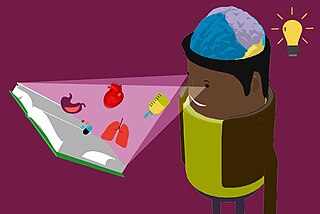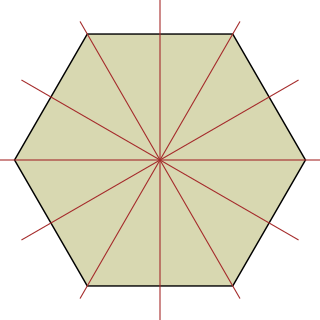Abstraction is a process wherein general rules and concepts are derived from the usage and classification of specific examples, literal signifiers, first principles, or other methods.

Category theory is a general theory of mathematical structures and their relations that was introduced by Samuel Eilenberg and Saunders Mac Lane in the middle of the 20th century in their foundational work on algebraic topology. Category theory is used in almost all areas of mathematics. In particular, many constructions of new mathematical objects from previous ones that appear similarly in several contexts are conveniently expressed and unified in terms of categories. Examples include quotient spaces, direct products, completion, and duality.

A concept is defined as an abstract idea. It is understood to be a fundamental building block underlying principles, thoughts and beliefs. Concepts play an important role in all aspects of cognition. As such, concepts are studied within such disciplines as linguistics, psychology, and philosophy, and these disciplines are interested in the logical and psychological structure of concepts, and how they are put together to form thoughts and sentences. The study of concepts has served as an important flagship of an emerging interdisciplinary approach, cognitive science.
A noun is a word that generally functions as the name of a specific object or set of objects, such as living creatures, places, actions, qualities, states of existence, or ideas.
Categorization is a type of cognition involving conceptual differentiation between characteristics of conscious experience, such as objects, events, or ideas. It involves the abstraction and differentiation of aspects of experience by sorting and distinguishing between groupings, through classification or typification on the basis of traits, features, similarities or other criteria that are universal to the group. Categorization is considered one of the most fundamental cognitive abilities, and it is studied particularly by psychology and cognitive linguistics.
In philosophy of mind and cognitive science, folk psychology, or commonsense psychology, is a human capacity to explain and predict the behavior and mental state of other people. Processes and items encountered in daily life such as pain, pleasure, excitement, and anxiety use common linguistic terms as opposed to technical or scientific jargon.
Moral reasoning is the study of how people think about right and wrong and how they acquire and apply moral rules. It is a subdiscipline of moral psychology that overlaps with moral philosophy, and is the foundation of descriptive ethics.
Semantic memory refers to general world knowledge that humans have accumulated throughout their lives. This general knowledge is intertwined in experience and dependent on culture. New concepts are learned by applying knowledge learned from things in the past.
In mathematics, a duality translates concepts, theorems or mathematical structures into other concepts, theorems or structures in a one-to-one fashion, often by means of an involution operation: if the dual of A is B, then the dual of B is A. Such involutions sometimes have fixed points, so that the dual of A is A itself. For example, Desargues' theorem is self-dual in this sense under the standard duality in projective geometry.
Prototype theory is a theory of categorization in cognitive science, particularly in psychology and cognitive linguistics, in which there is a graded degree of belonging to a conceptual category, and some members are more central than others. It emerged in 1971 with the work of psychologist Eleanor Rosch, and it has been described as a "Copernican Revolution" in the theory of categorization for its departure from the traditional Aristotelian categories. It has been criticized by those that still endorse the traditional theory of categories, like linguist Eugenio Coseriu and other proponents of the structural semantics paradigm.

Dual-coding theory is a theory of cognition that suggests that the mind processes information along two different channels; verbal, and visual. It was hypothesized by Allan Paivio of the University of Western Ontario in 1971. In developing this theory, Paivio used the idea that the formation of mental images aids learning through the picture superiority effect.
Experimental philosophy is an emerging field of philosophical inquiry that makes use of empirical data—often gathered through surveys which probe the intuitions of ordinary people—in order to inform research on philosophical questions. This use of empirical data is widely seen as opposed to a philosophical methodology that relies mainly on a priori justification, sometimes called "armchair" philosophy, by experimental philosophers. Experimental philosophy initially began by focusing on philosophical questions related to intentional action, the putative conflict between free will and determinism, and causal vs. descriptive theories of linguistic reference. However, experimental philosophy has continued to expand to new areas of research.
Moishe Postone was a Canadian historian and social theorist. He was a professor of history at the University of Chicago, where he was part of the Committee on Jewish Studies.
Concept learning, also known as category learning, concept attainment, and concept formation, is defined by Bruner, Goodnow, & Austin (1967) as "the search for and listing of attributes that can be used to distinguish exemplars from non exemplars of various categories". More simply put, concepts are the mental categories that help us classify objects, events, or ideas, building on the understanding that each object, event, or idea has a set of common relevant features. Thus, concept learning is a strategy which requires a learner to compare and contrast groups or categories that contain concept-relevant features with groups or categories that do not contain concept-relevant features.

Joshua Michael Knobe is an American experimental philosopher, whose work ranges across issues in philosophy of mind and action and ethics. He is Professor of Cognitive Science and Philosophy at Yale University. He is known for his work on the "Knobe effect" and use of experimental methods to understand personal reactions to moral dilemmas.

In social psychology, a stereotype is a generalized belief about a particular category of people. It is an expectation that people might have about every person of a particular group. The type of expectation can vary; it can be, for example, an expectation about the group's personality, preferences, appearance or ability. Stereotypes are often overgeneralized, inaccurate, and resistant to new information. A stereotype does not necessarily need to be a negative assumption. They may be positive, neutral, or negative.

Representation theory is a branch of mathematics that studies abstract algebraic structures by representing their elements as linear transformations of vector spaces, and studies modules over these abstract algebraic structures. In essence, a representation makes an abstract algebraic object more concrete by describing its elements by matrices and their algebraic operations. The theory of matrices and linear operators is well-understood, so representations of more abstract objects in terms of familiar linear algebra objects helps glean properties and sometimes simplify calculations on more abstract theories.
In mathematics, especially (higher) category theory, higher-dimensional algebra is the study of categorified structures. It has applications in nonabelian algebraic topology, and generalizes abstract algebra.

Embodied cognition is the concept suggesting that many features of cognition are shaped by the state and capacities of the organism. The cognitive features include a wide spectrum of cognitive functions, such as perception biases, memory recall, comprehension and high-level mental constructs and performance on various cognitive tasks. The bodily aspects involve the motor system, the perceptual system, the bodily interactions with the environment (situatedness), and the assumptions about the world built the functional structure of organism's brain and body.
Experimental jurisprudence (X-Jur) is an emerging field of legal scholarship that explores the nature of legal phenomena through psychological investigations of legal concepts. The field departs from traditional analytic legal philosophy in its ambition to elucidate common intuitions in a systematic fashion employing the methods of social science. Equally, unlike research in legal psychology, X-Jur emphasises the philosophical implications of its findings, such as whether, how, and in what respects the law's content is a matter of moral perspective. Whereas some legal theorists have welcomed X-Jur's emergence, others have expressed reservations about the contributions it seeks to make.






